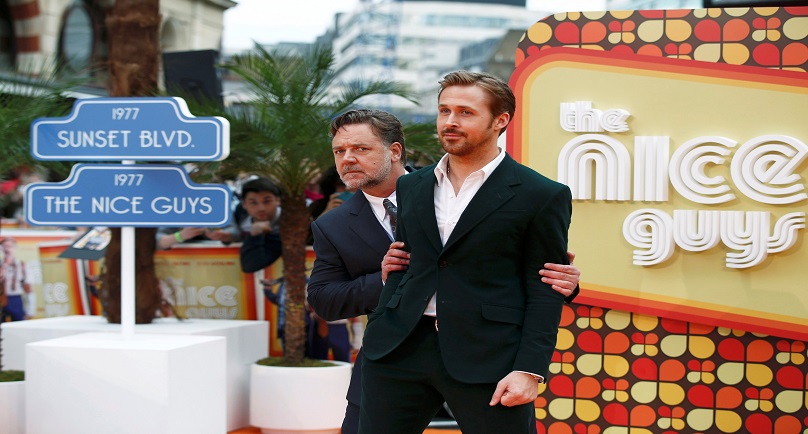Image:Actors Ryan Gosling and Russell Crowe (L) arrive at the UK Premiere of Nice Guys at a cinema in central London, Britain, May 19, 2016. REUTES/Peter Nicholls
![]()
By Piya Sinha-Roy
LOS ANGELES (Reuters) – Films about Hollywood often harken the glamour, glitz and golden age of cinema, but “The Nice Guys,” gives a very different sheen to Los Angeles in the late 1970s.
“LA had a kind of fallen feel, it was almost a biblical fallen feel, like a Sodom and Gomorrah, this place was a mess – the sky was crusted with smog, there was a porn cesspit on Hollywood Boulevard,” writer-director Shane Black said.
“It was the perfect faded glory scenario to put these two clowns in, these two gumshoes trying to fill shoes they can never fill.”
Black’s vision of Los Angeles comes to the big screen in the caper “The Nice Guys,” out in U.S. theaters on Friday. It follows two hopeless private eyes, Holland (Ryan Gosling) and Jackson (Russell Crowe).
The duo meet when Jackson breaks Holland’s arm. Grudgingly, they team up to solve an ever-deepening mystery of a missing girl that brings them face to face with the porn and automotive industries.
“This is like an anti-buddy movie,” Crowe said. “There’s not one bit of familial connection between these two guys that happens once, not a friendly gesture, nothing, they just happen to be stuck in a situation together.”
Crowe and Gosling engage in witty banter throughout the film as they find themselves in increasingly bizarre and surreal situations. Black said he wanted Crowe and Gosling’s relationship to reflect a more grown-up portrayal, adding that “the private eye genre is comprised largely of men, not boys.”
Crowe’s Jackson is the rough, looming counterpart to Gosling’s hapless, quip-filled Holland, who is often brought to task by his pre-teen daughter Holly (played by newcomer Angourie Rice), a relationship that Gosling said he enjoyed playing.
“He’s just such a disaster,” Gosling said of his character. “He’s seconds away all the time from being the worst person ever, and he has this daughter that’s literally propping him up and trying to help him be a good person.”
Black noted the underlying plot of government corruption affecting the smog that made the city’s air unbreathable. He said it could resonate with present day social themes.
“There is the same social unrest and it is reflected in what the seventies had to offer,” the filmmaker said. “You could just as easily see these guys acting on climate change now as they are on pollution in this movie.”
(Reporting by Piya Sinha-Roy; Editing by David Gregorio)
Copyright 2016 Thomson Reuters. Click for Restrictions.


